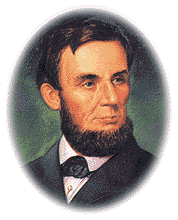
Abraham Lincoln
For Such A Time As This
A Baltimore newspaper published the following story
during the Civil War: "Passing through one of the hospitals devoted exclusively to
Confederate sick and wounded, President Lincoln's attention was drawn to a young
Georgian....
"Every stranger that entered (was) caught in his
restless eyes, in hope of their being some relative or friend. President Lincoln observed
this youthful soldier, approached and spoke, asking him if he suffered much pain. 'I do,'
was the reply. 'I have lost a leg, and feel I am sinking from exhaustion.'
"'Would you,' said Mr. Lincoln, 'shake hands with me if
I were to tell you who I am?' The response was affirmative, 'There should be no enemies in
this place.'
"Then said the distinguished visitor, 'I am Abraham
Lincoln, President of the United States.' The young sufferer raised his head, looking
amazed, and freely extended his hand, which Mr. Lincoln took and pressed tenderly for some
time."
Abraham Lincoln hated war. He despised the pain and
suffering and division it brought. From the time he took office until the day the South
surrendered, he was consumed with two goals; end the war and preserve the Union.
However, historians agree Lincoln was never ready to
preserve the Union at all costs. Slavery was a bitter word that rose in his mouth whenever
he allowed himself to think of the "monstrous injustice" it brought. It is a
"cancer," said Lincoln, "one that is threatening to grow out of control in
a nation originally dedicated to the inalienable right of man." Yet he held no
prejudice against the South. "They are just what we would be in their
situation."
However, the issue of slavery and the conviction that
something must be done to stop its spread were enough motivation to persuade Lincoln to
pursue a career in politics. In 1846 after having served one term on the Illinois State
Legislature (1834), he was elected to the U. S. Congress. Four major defeats (to the
Congress in 1848; the Senate in 1855 and 1858; and the U. S. Vice Presidential nomination
in 1856) kept him from public office until 1860 when he was chosen to represent the
Republican party during the Presidential election.
Election day found him waiting nervously at the Springfield,
Illinois, telegraph office for election results. By day's end, friends and family
addressed him as President-elect. "The North had swept Lincoln into office,"
writes author Russell Freedman. "In the South, his name hadn't even appeared on the
ballot."
Lincoln was born in Hardin County, Kentucky, in 1809. Thanks
to the devotion of his mother, Nancy, who died when he was quite young, and then his
stepmother, Sarah Bush, Lincoln grew to regard the Bible as a foundational tool for life.
Lincoln once said: "This great book [the Bible]...is the best gift God has given to
man...But for it we could not know right from wrong."
At the age of twenty-two Lincoln moved to New Salem,
Illinois, where he opened his first store. Later, he met and became close associates with
Mentor Graham, the town's schoolmaster. It was through this friendship and by joining
Graham's debate team that Lincoln discovered his talent as a public speaker.
Friend and attorney, John Todd Stuart, urged Lincoln to
study law, saying it was a good profession, especially if he wanted to enter politics.
Three years later, he passed his exams and began practicing law. With his future set,
Lincoln married Mary Todd on November 4, 1842. The Lincolns had three sons - Robert,
Willie, and Tad.
Despite his Christian upbringing, Lincoln did not accept
Christ as his Savior until later in life. While he governed the nation by many of the
principles written in God's Word, he lacked a personal relationship with Jesus Christ.
After the death of his son, Willie, Lincoln heard for the first time of Christ's personal
love and forgiveness for each man and woman.
He wrote: "When I left Springfield, I asked the people
to pray for me; I was not a Christian. When I buried my son - the severest trial of my
life - I was not a Christian. But when I went to Gettysburg, and saw the graves of
thousands of our soldiers, I then and there consecrated myself to Christ."
Finally, Lincoln had found the inner peace he longed for all
his life. Following his salvation experience, he worshiped regularly at the New York
Avenue Presbyterian Church and planned to make a public confession of his faith. The war
was winding down. Lee surrendered to Grant on April 9 - Palm Sunday, and Lincoln was
re-elected President. He gave thanks to God for bringing a close to the war and began
turning the nation's interest toward reconciliation and reconstruction. However, five days
later on Good Friday, he was shot by an assassin's bullet.
Throughout his life, Lincoln suffered many defeats - enough
to make most men give up. But not Abraham Lincoln. His dedication and commitment found
merit in heaven. He believed he was chosen "for such a time as this."
In the Gettysburg Address he wrote: "We cannot escape
history. We...will be remembered in spite of ourselves....In giving freedom to the slave,
we assure freedom to the free - honorable alike in what we give, and what we
preserve." been a miracle of God's grace all the way through." |
